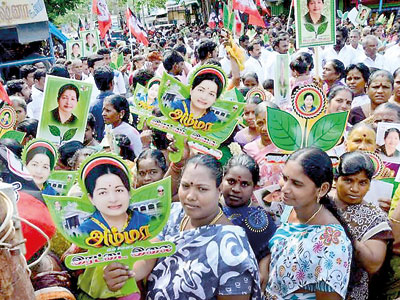News
Rivalry within rivalry as crucial Tamil Nadu by-election nears

By-election fever in RK. Nagar. Photo Credit: the Hindu/G. Sribharath
The political situation in Tamil Nadu, home to Dravidian fanaticism and Tamil chauvinism, is rapidly changing. To make the story short, the so-called Dravidians are fighting among themselves till the rivals fall dead. It is reminiscent of the incident from the great Indian Epic Mahabharatha where Yadavas, the descendants of Lord Krishna, fought each other and ended up leaving no one to survive.
The All India Anna Dravida Munnetra Kazhakam (AIADMK), the largest Dravidian party, which boasts of a membership of 15 million cadres, has been split vertically and fighting each other for the legacy of Jayalalithaa Jayaram, since her death on December 5, 2016. The two AIADMK factions, (the name and election symbol of the party has been frozen since then) are fighting it out in the open in the by-election to be held from R K Nagar, a Chennai suburb, which became vacant following the mysterious death of the late chief minister.
The faction headed by the AIADMK’s jailed general secretary, V.K. Sasikala, goes as AIADMK-Amma while the group led by rebel O Panneerselvam, the former chief minister, styles itself as AIADMK-Puratchi Thalaivi Amma or Revolutionary Leader Amma.
The Amma faction is fielding T.T.V. Dinakaran, Sasikala’s nephew, as its candidate. With the AIADMK’s twin-leaf symbol being frozen in view of the dispute, the Elections Commission has allocated him the Hat symbol. The Panneerselvan group has brought in E. Madhusoodanan, and he is contesting under the Electric Pole symbol.
The AIADMK‚Äôs arch rival, the Dravida Munnetra Kazhakam, too, is plagued by problems. The infighting between the sons of the 94-year-old party patriarch Mutuvel Karunanidhi,¬† who has been incapacitated since he suffered a stroke in October 2016, has weakened the party. M K Stalin, his younger son is waging a battle with his elder brother Alagiri for the control of the party. Just as the proverb ‚ÄėEast is East and West is West and never the twain shall meet‚Äô, the AIADMK and the DMK would never join hands till one of the two is annihilated.
There is no ideology which sustains these parties. Now that both Jaylalithaa and Karunanidhi are out of the centre stage of Tamil Nadu politics, the successors have to find out issues on which they could fight eternally.
Though both the parties along with some fringe elements (which do not command more than one percent of the popular vote even if they contest together) have made the Tamil Eelam and Sri Lanka war crimes probe a political issue only to win the votes of Tamil chauvinist elements because their support will be crucial in the event of a tight contest.
Against the backdrop of these developments, an observation made by Sri Lanka born S, Muthiah, a Tamil historian based in Chennai is significant. While felicitating V. Suryanarayan, a former professor who authored the book ‚ÄėTamil Diaspora: Myth and Reality‚Äô, in Chennai last Friday, Muthiah pointed out that Tamils of Indian origin based in Sri Lanka, especially in the plantations and southern region were the most backward in the island nation. ‚ÄúIn fact they are the most backward among the backward communities, even backward than the most backwards in India. They could be helped by India without much problems,‚ÄĚ said Muthiah.
He said Tamil Nadu, home to hundreds of educational institutions including engineering, arts and science and medical colleges could set apart some seats for students from the Tamils of Indian origin. The suggestion was welcomed by hundreds of Tamils who were present in the auditorium. Not without any reason. There are more than 600 engineering colleges in Tamil Nadu. Every year, more than 100,000 seats go a-begging in these engineering colleges forcing many of them to down shutters.
According to figures released by the Tamil Nadu government, there were no takers for 102,510 engineering college seats in 2014. In 2013, the figure stood at 79,303. ‚ÄúInstead of staging demonstrations all over the State demanding Eelam and autonomy, what the friends of Sri Lankan Tamils should do is to plead with the State government and get the Tamil students from the island nation admitted in these professional colleges. Each graduate passing out of these colleges will go back to Sri Lanka as India‚Äôs life-long friends,‚ÄĚ said Subramanian Swamy, MP and senior BJP leader.
The suggestion should come from the Tamil National Alliance or the representatives of the Tamils of Indian origin. Many of the students could be offered scholarship by the Tamil Nadu government. Once they complete the courses, they could be employed in India itself or they could become entrepreneurs.
The demand for fishing rights in ‚Äútraditional waters‚ÄĚ of Tamil Nadu fishermen and the retrieval of Kachchativu have lost their relevance in the changed scenario. It is time for Tamil Nadu politicians to think practically and pragmatically.

